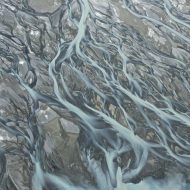
Registers of Loss, Pain, Hope, and Climate Change in India. Rahul Ranjan, Postdoc for the Riverine Rights project and Shalini Iyengar, a PhD candidate at Yale University, co-organised the lecture series this fall term 2022.
In the epoch of Anthropocene, the vocabulary of loss and pain is commonplace. Defined variously, this epoch surfaces in violent footprints on entire ecologies and chronicles the devastation of biodiversity as a regular occurrence. Moreover, these changes manifest beyond species extinction and other material impacts by reorienting human imagination itself. Often, the causal explanation of this change is anthropogenic intervention in fragile ecologies. The effects of such interventions are not, of course, limited to a controlled area but ripple out and interact with other vulnerabilities in often unpredictable ways. Unsurprisingly, it imposes the heaviest burdens on those placed at the bottom rung of the society – seeking to destroy their varied forms of livelihood, and patterns of employment, among others.
The grim reality of these changes demand massive shifts in policy thinking around climate adaptation and mitigation as well as a fundamental reorientation of thinking about life itself. Capturing these changes and their entangled afterlives requires the crafting of narratives and discourses that illustrate both these diverse losses as well as attend to the ways in which human and more-than-human lives are able to flourish amidst the ruination. After all, at the critical feature of the Anthropocene is that it is fundamentally an era of complex entanglements.
This lecture series sought to begin a conversation on the Anthropocene entanglement as a form of engagement, a descriptive illustration of changes (loss, pain, joy, and celebration). that fills our lives.
Below are details and speakers for each series:
- Pasang Sherpa (UBC): “Living in the Midst of Dying” Here’s the link: https://www.rahul-ranjan.com/public-engagemnets/v/hfx2cel2x48eje7fdxlextxjfacgld
- Radhika Govindarajan (University of Washington) and Mona Bhan (Syracuse University): “More-Than-Human Fascism” Here’s the link:
- Shalini Sharma (IISER, Pune): “Remember Bhopal Museum: The Struggle Over The Future” Here’s the link:
- Dolly Kikon (University of Melbourne): “Feeling the Morom? Situating Life in a Carbon Landscape” Here’s the link: https://www.rahul-ranjan.com/public-engagemnets/v/a-himalayan-manthropocene-by-dr-ritodhi-chakraborty-university-of-canterbury
- Sumana Roy (Ashoka University): “Climate Change and the Loss of Ananda” Here’s the link: https://www.rahul-ranjan.com/public-engagemnets/v/a-himalayan-manthropocene-by-dr-ritodhi-chakraborty-university-of-canterbury
- Ritodhi Chakraborrty (University of Canterbury): “A Himalayan (M)anthropocene? Patriarchy, caste and emerging climate society relationships in Uttarakhand” Here’s the link: https://www.rahul-ranjan.com/public-engagemnets/v/a-himalayan-manthropocene-by-dr-ritodhi-chakraborty-university-of-canterbury
